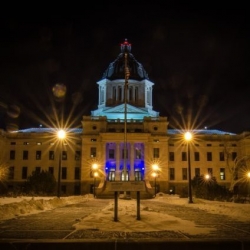
Deadwood casinos and tribal casinos would win the right to host sports betting, but the Yankton Sioux Casino would have a new rival in the Port Yankton Project.
The South Dakota State Senate passed two resolutions this week which would expand gambling in the state, including a plebiscite involving sports betting legalization. Both bills passed narrowly, moving them on to the House of Representatives.
Senate Joint Resolution 2 would approve a referendum on whether to allow sportsbooks in Deadwood casinos. The Senate voted 18-14 to approve the ballot initiative.
A second bill passed by the Senate State Affairs Committee would approve a Yankton casino. To do so, the bill approves a referendum to ask the state’s voters whether Deadwood’s long monopoly on land-based casinos should be ended.
The proposed Senate Affairs Committee referendum passed by a slim 5-4 margin. Comments by lawmakers on both sides of the debate suggest the bills could be controversial in North Dakota.
Troy Heinert on Sports Betting Referendum
Senate Minority Leader Troy Heinert (D-Mission) tried to defuse controversy by reminding legislators they were not voting to approve sports betting. Instead, they were voting on whether the people of the state should be allowed to decide the issue in a referendum.
Heinert reminded the same lawmakers that their predecessors had done the same in the 1980s with the decision to legalize casino gambling in the first place.
Jim Bolin Disputes Revenue Claims
State Sen. Jim Bolin (R-Canton) took a different tack. In an interview with the Sioux Falls Argus Leader, Sen. Bolin disputed claims that sports betting would generate revenues for the Deadwood casinos.
Pointing to a report issued by the South Dakota Department of Revenue, Bolin cited concerns that sports betting would generate less revenue than it would cost the state to regulate it. In the Sioux Falls newspaper, Sen. Bolin called the projected revenue a “mirage”.
Though the measure would approve sports betting for the Deadwood casinos, it indirectly would open the door for sports betting in the state’s 11 tribal casinos. Under the terms of the gaming compact between the tribes and South Dakota’s government, the 7 tribes which own the casinos have the right to offer any form of gambling which commercial casinos have.
Support for Port Yankton Project
The nonprofit political action committee “Yankton Area Progressive Growth” had called for the vote on the Port Yankton Project, which is the name of the proposed casino’s development plan. Sen. Justin Cronin (R-Gettysburg), who supports the referendum, called for a Wednesday vote after “a very long and very fair hearing” on Tuesday. Most local Yankton officials also support the plan.
Lisa Kaczke of The Argus Leader wrote, “Yankton officials testified on Wednesday that Port Yankton would fill a gap in the tourism economy in a city that faces the same challenges as other rural communities. However, tribes pushed back on the measure because it could negatively hurt nearby casinos that fund community programs on the reservations.”
South Dakota Tribes Oppose Yankton Casino
Those same tribes oppose the creation of a new Yankton casino. Yankton Sioux Tribe’s Fort Randall Casino already operates in the area and the tribes fear that a new casino would cannibalize revenues and endanger jobs in the tribal casino.
The Yankton Sioux casino employs 240 workers and funds local community programs. The Sioux believe a second casino in a saturated casino would lead to layoffs. Thelma Thomas, who serves as the general manager of the Ohiya Casino and Resort, said that any bill to establish commercial casinos would have the effect of undermining tribal government resources.
Ms. Thomas told the Argus Leader, “We’re facing 75 percent unemployment rates. Nobody was stepping forward to assist us so our families could be drawing a weekly paycheck. We created that.”
Opponents of the Port Yankton Project pointed out that the hearings did not call tribal leaders from South Dakota, but instead called on leaders of the Santee Sioux Tribe of Nebraska — which has a casino just across the border in Nebraska — to testify before the Senate. The Santee Sioux are business rivals of the Yankton Sioux.
